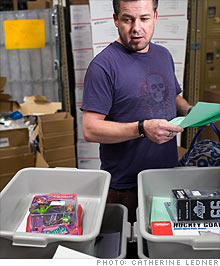Pay for the marketing that works
Tough times force an online retailer to reshape his marketing plan.


 |
| Staffer Mark Julien inspects orders before shipping. |
(Fortune Small Business) -- In May 2008 I nearly had a nervous breakdown -- and for good reason.
Five months earlier I'd invested heavily in inventory for my company, Toyrocket.com, an online toy retailer. I had also signed a five-year lease on a new warehouse. Then the economy tanked. Sales through our Web site slumped, as did those on Amazon (AMZN, Fortune 500) and eBay (EBAY, Fortune 500). I didn't think I could cut enough costs to keep the seven-year-old company alive. It looked as if my wife and I would have to declare bankruptcy and lose our house in the process (some of our debt was personally guaranteed).
So I bought time by negotiating payment plans with our vendors, which gave me breathing space until year-end. I also studied our spending. Payroll was our biggest expense, but most of my employees are friends, so job cuts weren't an option. Then I looked at our next largest cost: marketing -- and found much waste.
For starters, we were paying for pay-per-click marketing on both search engines and shopping comparison sites. Search-engine pay-per-clicks like Google (GOOG, Fortune 500) AdWords required us to specify words or phrases, such as "Incredible Hulk," that would make our ads show up in search results. We'd then enter a maximum amount that we were willing to pay per click. I soon saw that the shopping sites were bidding for the same terms on Google and Yahoo (YHOO, Fortune 500) as we were, which meant our products appeared through their sites in Web searches. We were paying for the same thing twice.
I also learned that pay-per-click customers, those who found us through online ads, made up 65% of our business but were less likely to return than customers who found us using organic search, the nonsponsored links that appear in the main part of a Google or Yahoo search.
Our marketing strategy had to change. First, I pulled our entire collection from shopping comparison sites, knocking $6,000 off our monthly marketing costs. Next, I cut our search-engine marketing budget and focused on drawing more loyal customers with organic search. To my horror, when I typed the names of our best-selling toys into search engines, Toyrocket.com failed to appear in the first three or four pages of organic results.
With the help of our IT manager, I began reworking the site. New content catches the attention of search engines. So we built a site map -- a map of all our Website pages -- from which we could generate a concise content log called an XML (extensible markup language) feed. We directed search engines to that feed so they could scan it weekly and register any new products on our site. We also added features, devising ways to give tips to shoppers as they browsed the site, offering gift certificates and creating regular e-mail updates announcing our latest deals.
It took a few months for the changes to take effect, but by the holiday season our organic search rankings had greatly improved. That goosed our November/December 2008 Web site sales, which grew 25% to about $400,000 over the same period in 2007 -- all with 30% less paid advertising online. We had never seen such growth without spending more on pay-per-click marketing. Still, we project flat 2009 revenues because of our lower sales on Amazon and eBay.
I paid off all of our vendors. Even better, I learned a lesson. When business was good, I threw money at online marketing without studying its effects. The grim economy forced me to do what I should have done sooner: Spend every dollar as if it were my last. ![]()
-
The Cheesecake Factory created smaller portions to survive the downturn. Play
-
A breeder of award-winning marijuana seeds is following the money and heading to the U.S. More
-
Most small businesses die within five years, but Amish businesses have a survival rate north of 90%. More
-
The 10 most popular franchise brands over the past decade -- and their failure rates. More
-
These firms are the last left in America making iconic products now in their twilight. More









